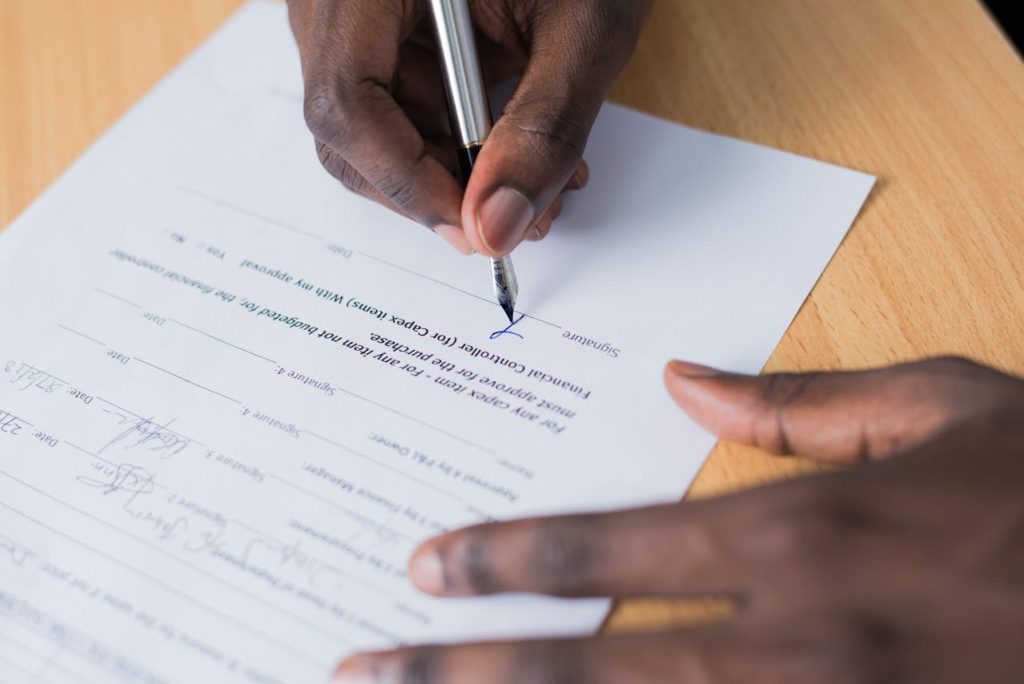
When you think about inheritance, you probably picture a smooth process. Someone passes away, their wishes are clear, and the assets go to the right people. But it’s not always that simple. One missing signature can erase your inheritance, leaving you with nothing but frustration and questions. This isn’t just a rare legal technicality. It happens more often than you might think, and it can affect anyone. If you want to protect what’s rightfully yours, you need to know how a single oversight can change everything. Here’s what you need to watch out for.
1. The Power of a Signature in Estate Planning
A signature is more than just ink on paper. It’s proof that someone agreed to the terms in a will, trust, or other legal document. Without it, the document may not be valid. This means the court could ignore the entire document, no matter how clear the intentions were. If a will isn’t signed, it’s just a piece of paper. The law requires a signature to make it official. This is true in almost every state. If you’re counting on an inheritance, make sure the paperwork is signed and dated. Otherwise, you could lose everything.
2. Wills Without Signatures Are Often Thrown Out
A will is supposed to specify who receives what. But if it’s missing a signature, the court may throw it out. This isn’t just a technicality. The law is strict about this for a reason. Without a signature, there’s no way to prove the person actually agreed to the will’s terms. In many cases, the court will treat the estate as if there were no will at all. That means state laws decide who gets the assets, not the person who passed away. You could be left out, even if you were supposed to inherit everything.
3. Trusts Need Proper Signatures Too
Trusts are another method by which people can pass on assets. But they also need signatures to be valid. If the person who created the trust didn’t sign it, the trust might not hold up in court. This can lead to long legal battles. Family members may fight over what the person wanted. The court could decide the trust is invalid, and the assets might go to someone else. If you’re named in a trust, check that it’s signed. Don’t assume everything is in order.
4. Witnesses and Notarization: More Than Formalities
It’s not just the main signature that matters. Most states require witnesses to sign a will or trust, too. Some documents also need to be notarized. If any of these signatures are missing, the document could be challenged. Courts look for these extra steps to make sure the document is real and not forged. If a witness forgets to sign or if the notary stamp is missing, your inheritance could be at risk. Always double-check that all required signatures are present.
5. Outdated Documents Can Cause Problems
Sometimes, people update their wills or trusts but forget to sign the new version. Or they sign, but forget to have witnesses. In these cases, the old document might still be valid, or neither document might count. This creates confusion and can lead to court battles. If you’re expecting an inheritance, ask if the documents are up to date and properly signed. Don’t wait until it’s too late.
6. Digital Signatures: Are They Enough?
With more people using digital tools, some try to sign wills or trusts electronically. But not all states accept digital signatures for these documents. If the law doesn’t allow it, a digital signature is as good as no signature at all. This can erase your inheritance in an instant. If you’re using digital tools, check your state’s laws first. Make sure the signature is legally valid, or you could lose everything.
7. What Happens If a Signature Is Missing?
If a required signature is missing, the court may declare the will or trust invalid. This means the estate is handled as if there were no plan at all. State laws, called intestacy laws, decide who gets the assets. These laws don’t always match what the person wanted. You could lose your inheritance to distant relatives or even the state. Legal battles can drag on for years, costing everyone time and money. The best way to avoid this is to make sure every document is signed, witnessed, and notarized as required.
8. How to Protect Your Inheritance
Don’t assume everything is fine just because someone said you’re in the will. Ask to see the documents. Check for signatures, dates, and witness names. If you’re unsure, consult an estate attorney. They can review the paperwork and spot any problems. If you’re creating your own will or trust, follow every legal step. Don’t leave anything to chance. A missing signature can erase your inheritance, but a little caution can protect it.
One Signature Can Change Everything
A missing signature might seem like a small detail, but it can erase your inheritance in a heartbeat. The law is clear: no signature, no inheritance. Don’t let a simple mistake cost you what’s rightfully yours. Check every document, ask questions, and get help if you need it. Your future could depend on one signature.
Have you ever faced a problem with missing signatures in estate planning? Share your story or thoughts in the comments.
Read More
Habits That Make You Look Wealthier Than You Actually Are
8 Grooming Fails Women Think Are Fine (But Men Secretly Can’t Stand)
The post How One Missing Signature Can Erase Your Inheritance appeared first on The Free Financial Advisor.







